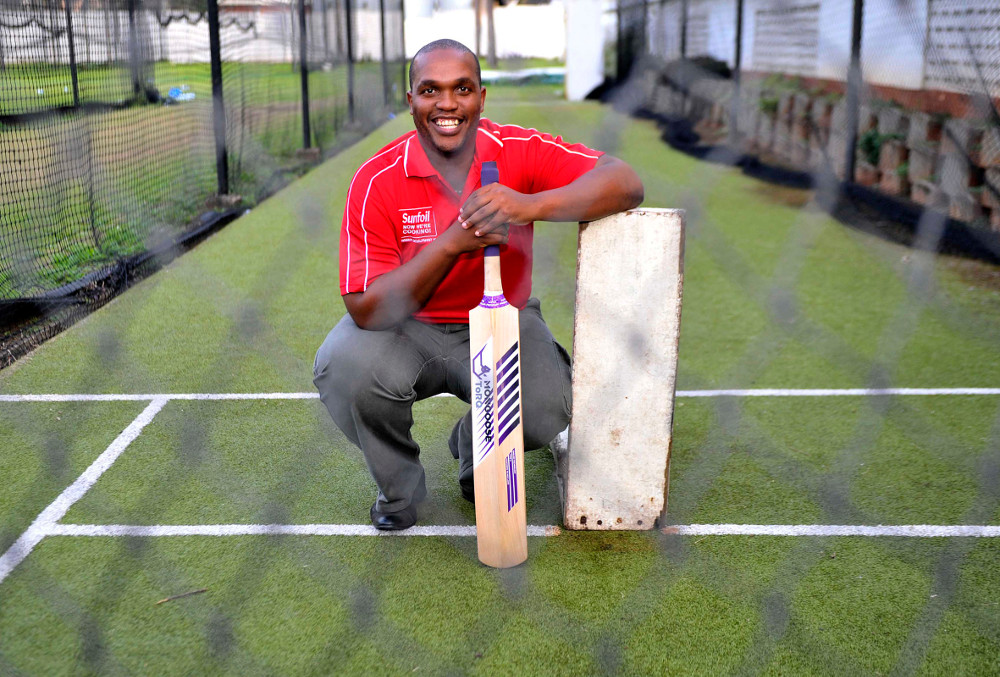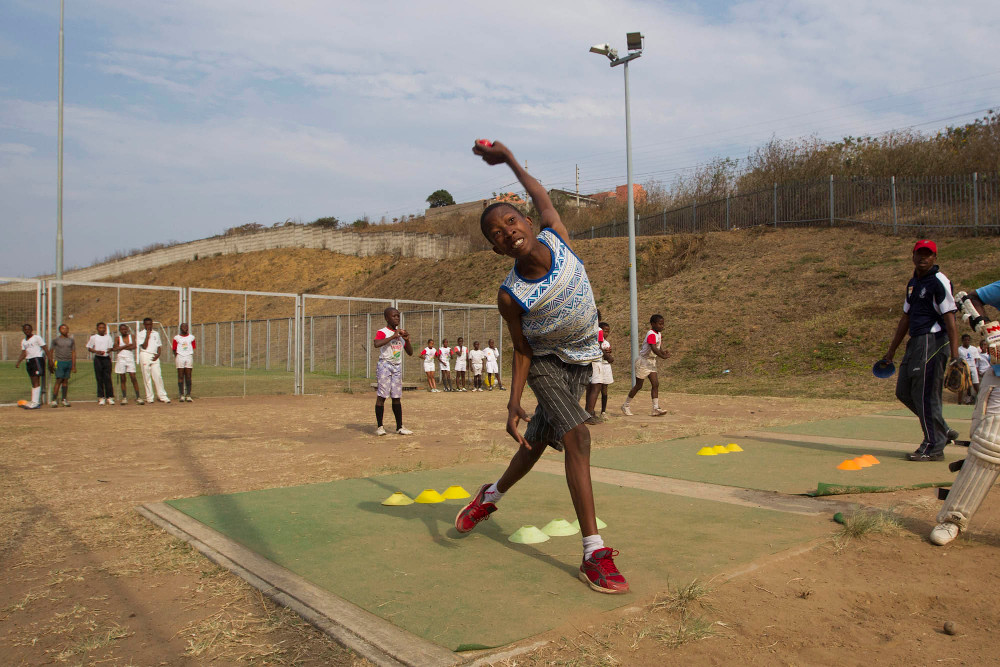It’s just after 3pm on a Tuesday afternoon and my 10-year-old son Amr and several of his friends are in the midst of a preseason school cricket net practice with a group of boys an age division ahead of them, a privilege they have been afforded because they excelled during the past season.
A coach is assisting Amr and his friends with some technical aspects of their bowling. Another coach watches the other boys.
I’m observing the goings-on from a chair on the balcony of the Swan Pavilion that overlooks Wandsbeck, Westville Senior Primary School’s main sports field. The cricket nets are in a corner of it.
In the centre, the pitch is cordoned off in preparation for many of next term’s home cricket fixtures. Other fixtures will take place a few blocks away on the Sefton field, which has an artificial pitch and its own set of nets. For away games, parents will drive the boys to schools such as Glenwood Prep, Durban Preparatory High School and Clifton – some also former model C, others private – all of which have equally decent or more impressive facilities.
The scene is very different in Umlazi the following afternoon, where I’m watching the cream of the township’s cricketing crop at practice. There are no chairs, let alone a pavilion, so I’m sitting on a concrete slab – covering a sewerage drain – in dangerously close proximity to three shabby nets, which stand alongside a basketball court behind the township’s King Zwelithini Stadium.
Plastic cone with water
In the middle of practice, a boy of about 11 is hit in the face with a ball and bursts into tears. The coach runs off and promptly returns with a plastic cone filled with water. “Our first-aid kit,” he says, smiling at me.
There are no change rooms and next to me a group of new arrivals are changing into their sports kits – white shorts and white T-shirts – while in front of me, by default, everyone in every division, ranging from under-10 to under-16, is training at the same time.
But there is no dearth of cricketing talent here.
“Are you seeing cricket?” Linda Zondi, the man in charge of KwaZulu-Natal Cricket’s township and rural areas development programme, asks, grinning knowingly.

Linda Zondi, manager of KZN Cricket’s township and rural areas development programme.
(City Press)
“This laaitie can play,” he says, pointing to a boy who has just arrived. “Look at these left-arm spinners – they flight the ball, and they chow you … And see that guy, that guy is a wicketkeeper; he’s going to keep for the Proteas one day. I’m taking him to Westville Boys’ High for a bursary assessment next week. If they see this guy keep wicket, they won’t even hesitate.”
In 1987, Zondi (then 11) was introduced to cricket through what was then known as Bakers mini-cricket in KwaMashu. He later made it into the province’s under-12, under-15, under-17 and under-19 sides, and completed his secondary schooling on a bursary at Glenwood High.
He also played alongside former Proteas Mark Boucher and Makhaya Ntini for South Africa under-19 and the Dolphins B team. But that’s where the dream ended.
“Why didn’t we make it [to a higher level]? Was it that we were not good enough, or maybe it was that we were not given a fair opportunity?” he asks.
Huge strides
Zondi, who is also a Proteas selector, left his post as director of cricket at his alma mater seven years ago to head the development programme. Since then, he has made huge strides in affording children from disadvantaged backgrounds opportunities to reach the level he himself never reached.
About 30 townships and rural areas, including Inanda, KwaMashu, Ntuzuma, Umlazi, Lindelani and Chesterville, benefit from the programme, which starts with the introduction of KFC Mini-Cricket at schools.
Zondi assigns a coach to work with children at various schools (he stresses that it must be a coach from the township who understands its culture). Talented children from different schools in the area then form an elite group and are given extra coaching after school (as is the case at the King Zwelithini Stadium).
Over weekends, all those displaying talent from a particular township are brought together for a collective coaching session, constituting township clubs, which then play against other clubs in their respective zones during the cricket season.
Township school teams are also formed and they play each other, as well as development teams from other provinces, in the annual KwaZulu-Natal Cricket Union Sunfoil Township Tournament. An elite provincial development squad is selected and invited to Kingsmead for additional weekly coaching. This side then plays “traditional white schools”, such as Glenwood High, when possible.
Zondi pulls this off with limited resources. For starters, only Umlazi and KwaMashu have cricket facilities to speak of, and they are nowhere near ideal. At the nets at King Zwelithini Stadium, he points out a boy who has developed a knee problem because of the long hours of practising on an uneven surface.
Kit is also an issue but often, when they hear about the programme, parents of children attending more privileged schools sponsor items such as cricket boots and bats, he says.
Selected on merit
Still, the programme has produced impressive results. Last season, the Umlazi Cricket Club won the under-11, under-13 and under-15 divisions in the Durban and Districts Cricket Union League, in which it competed against well-known teams such as Harlequins, Chatsworth Sporting and Delta.
Several boys from the programme have also made it into the provincial teams in their respective age groups – on merit, Zondi stresses – despite the fact that a lack of funding has meant that one coach, who receives only a stipend for now, has to be assigned to several schools. In Umlazi, for example, 27-year-old Sandile Simelane takes care of 19 schools, some of which he visits weekly, others fortnightly.
“So, if we look at your son’s school as an example, the under-10s, under-11s and so on each have their own set of coaches,” Zondi says. “Here, one coach looks after [many] schools. We have to ask: Is the status quo balanced?
“But funding is an issue, and we make do with what we have. My dream is to reach a stage where one coach looks after one school.”

KZN Cricket’s township and rural areas development programme.
(City Press)
Simelane often has to double up as a counsellor. “Sometimes a kid will come to training yawning. When you do some digging, you find out he hasn’t had a decent meal in three days. Or you may find a kid sleeping in the taxi on the way to games, and you find out he doesn’t have a bed at home.”
But he’s not complaining. “It’s not a job – it’s my life,” he says. “Developing sport in a township means an array of things. It means one less drug addict, one less thief, but mostly it means grooming future leaders.”
Simelane and other coaches in Umlazi report to Kenneth Mafunga, the head coach of the Umlazi Cricket Club. “I have told the coaches that we need to make do with what we have,” Mafunga says. “It’s not about complaining; the results will come. In our culture, we strive under pressure.”
Mafunga is based at the Umlazi Comprehensive Technical High School, which boasts the township’s only cricket field and serves as the home ground for the Umlazi Cricket Club. He has been trying to get as many cricketers as possible into the school – which has a boarding facility and a reputation for having a good standard of education – so that it can become the “cricket school of the township” and someday play against other schools.
But Zondi has found another way to ensure at least some of the children experience school cricket at its highest level – he has managed to get bursaries for them to study at traditional cricketing schools, both at primary and secondary level.
Sunset is approaching and, at the King Zwelithini Stadium, senior club players are starting to arrive for their practice session. The little boy who was hit in the face with a cricket ball has gone home. His friends are ending their session with some stretches. They are standing in a circle and singing a Zulu song with great fervour, as they follow their coach’s instructions. Zondi translates for me: “They are saying they won’t give up … they will never lose strength.”
Next week, Fatima Asmal reports on the immense challenges facing those who get the coveted bursaries to traditional cricketing schools.